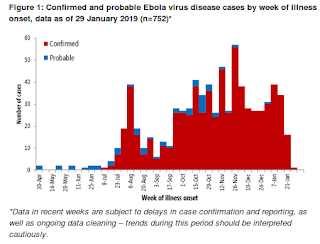#13,825
The second largest Ebola outbreak on record - which erupted in the eastern part of the DRC 6 months ago - has been fueled by limited resources, a hotly disputed presidential election, public protests and mistrust, and even some attacks on healthcare personnel and treatment facilities.
Confirmed and probable cases have now reached (and likely exceeded) 752 - an increase of 39 over last week's report. Despite attempts at infection control, nosocomial infections have played a large role in this outbreak, and to date 65 Healthcare workers have been infected.The World Health Organization has released their latest weekly situation report and Risk Assessment on the Ebola outbreak. I've only included some excerpts from a much larger report, so follow the link to read it in its entirety.
Ebola virus disease – Democratic Republic of the Congo
The Ministry of Health (MoH), WHO and partners continue to respond to an outbreak of Ebola virus disease (EVD), despite persistent challenges around security and community mistrust impacting response measures. Relatively high numbers of cases were reported in recent weeks (Figure 1), mostly driven by the outbreak in Katwa Health Zone; the current focus of large scale response activities.
Smaller clusters continue to be reported beyond Katwa Health Zone, including from Beni and Oicha; however, teams have quickly and systematically responded to these clusters to prevent onward transmission and guard against further geographical expansion of the outbreak. Teams are also working actively to strengthen community trust and participation in all affected areas.
As we approach six months since declaration of the outbreak, there have been a total of 752 EVD cases1 (698 confirmed and 54 probable) reported, including 465 deaths (overall case fatality ratio: 62%) as of 29 January 2019. Thus far, 259 people have been discharged from Ebola Treatment Centres (ETCs) and enrolled in a dedicated program for monitoring and supporting survivors. Among cases with a reported age and sex, 59% (439/750) were female, and 30% (224/749) were aged less than 18 years; including 115 children under 5 years.
During the last 21 days (9 January – 29 January 2019), 118 new cases have been reported from 11 health zones (Figure 2), including: Katwa (80), Beni (9), Butembo (7), Kayina (5), Manguredjipa (4), Oicha (4), Biena (3), Kyondo (2), Musienene (2), Komanda (1) and Vuhovi (1). In addition, five historic probable cases from Komanda Health Zone were reported during the past week with illness onset dating back to November 2018.
The outbreak in Katwa and Butembo health zones is partly being driven by nosocomial transmission events in private and public health centres. Since 1 December 2018, 86% (125/145) of cases in these areas had visited or worked in a health care facility before or after their onset of illness. Of those, 21% (30/145) reported contact with a health care facility before their onset of illness, suggesting possible nosocomial transmission.
In Katwa during the past 3 weeks (since 9 January), 49 health structures were identified where confirmed cases were hospitalised, including nine health centres where nosocomial transmission potentially occurred. Moreover, during the same period, eight new health care worker (HCW) infections were reported in Katwa; overall, 65 HCWs have been infected to date. Response teams are following up with the identified health care facilities to address gaps around triage, case detection and infection prevention and control measures.(SNIP)
WHO risk assessment
WHO reviewed its risk assessment for the outbreak and the risk remains very high at the national and regional levels; the global risk level remains low. This Ebola virus outbreak is affecting north-eastern provinces of the Democratic Republic of the Congo bordering Uganda, Rwanda and South Sudan. There is a potential risk for transmission of Ebola virus at the national and regional levels due to extensive travel between the affected areas, the rest of the country, and neighbouring countries for economic and personal reasons as well as due to insecurity.
The country is concurrently experiencing other epidemics (e.g. cholera, vaccine-derived poliomyelitis, malaria), and a long-term humanitarian crisis. Additionally, the security situation in North Kivu and Ituri at times limits the implementation of response activities.
As the risk of national and regional spread is very high, it is important for neighbouring provinces and countries to enhance surveillance and preparedness activities. The International Health Regulations (IHR 2005) Emergency Committee has advised that failing to intensify these preparedness and surveillance activities would lead to worsening conditions and further spread. WHO will continue to work with neighbouring countries and partners to ensure that health authorities are alerted and are operationally prepared to respond.(Continue . . . )
